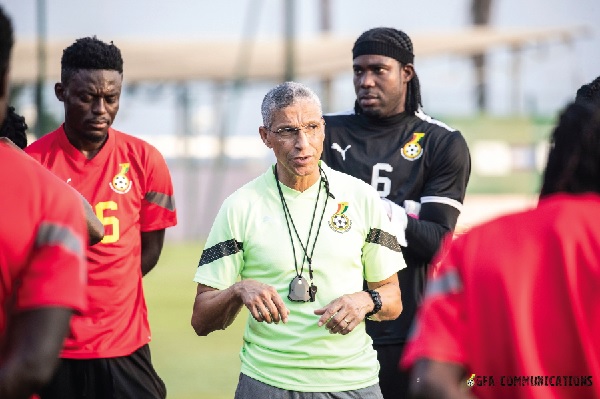
What it cost taxpayers to maintain the Black Stars
In the wake of Ghana's abysmal performance at the 2023 Africa Cup of Nations (AFCON), there has been public outcry over the swiftness with which the Ghana Football Association (GFA) set into motion a process to recruit a new coach for the national team.
While the departure of Hughton was expected, the broader picture of frequent coaching changes over the past five years and the resulting financial repercussions have sparked a debate on the exorbitant costs associated with maintaining the Black Stars machinery.
When Coach Hughton went through the Black Stars exit door, he walked away from the €46,000-per-month job he had held for 11 months, rest-assured that he was not leaving empty-handed.
With his contract expected to run until December 2023, the 65-year-old Irish coach may be eyeing compensation for the FA's decision to fire him midway through his contract.
The Graphic Business understands that the coach's contract included a clause for a review after the AFCON, which was a key performance indicator.
In the immediate aftermath of the team's elimination from the tournament, the team's management committee headed by GFA vice-president, Mark Addo, held a meeting with Hughton in Abidjan and asked the coach to step down but he refused to comply with the directive following which his employers took the decision to terminate his contract.
Exit packages
Former Black Stars coaches, Charles Akonnor and his successor, Milovan Rajevac, sacked after Ghana's exit at the 2021 AFCON, are also due compensation after being sacked midway through their contracts.
In August last year, the Ministry of Youth and Sports issued a statement detailing payments totalling $508,108.12 made to Akonnor in outstanding salaries and compensation, with an amount of $220,000 outstanding.
However, no details were made about compensation to Rajevac even though the Ministry acknowledged it owed the Serbian coach.
The financial storm intensified last week when the MP for North Tongu, Samuel Okudzeto Ablakwa, questioned the fiscal wisdom of allocating substantial funds to the underperforming Black Stars, considering the country's economic challenges.
Documents presented to Parliament disclosed that an eye-watering GHS27,967,036.34 was spent on just five line items related to Black Stars activities, highlighting the magnitude of the financial commitment:
1) 2024 AFCON Qualifiers (Ghana vs Angola — Home & Away) — GH¢7,452,437.71
2) 2024 AFCON Qualifiers (Ghana vs Madagascar — Home & Away) — GH¢8,395,434.13
3) 2024 AFCON Qualifiers (Ghana vs Central Africa Republic — Home & Away) — GH¢3,414,894.51
4) April to June 2023 salaries of the coach & signing on fees — GH¢3,379,548.10
5) The official ministerial documents also reveal that it cost taxpayers a significant GH¢5,324,721.89 to airlift supporters of the Black Stars during the 2022 FIFA World Cup in Qatar.
Financial prudence
Two weeks ago, it was revealed that the ministry paid stipends of $400 to each of the supporters it sponsored to Cote d'Ivoire to support the Black Stars at the 2023 AFCON, even though it had been suggested that about $500,000 would have gone into mobilization of hundreds of cheer groups, some MPs and other government officials, as well as apparatchiks of the ruling party.
Ghana's continued struggles at international competitions have created a somewhat toxic relationship between the public and the Black Stars players who are viewed as over-pampered but underperforming athletes who prioritise financial gains over the pride and honour of representing the country.
There is also a growing perception that the senior national team has become a money-making machinery for some people within the corridors of power, reflected in public anger that five members of the Black Stars Management Committee were paid $500,000 for their two-week stay with the team at the World Cup in Qatar.
Disappointment over the team's group-stage exit at the ongoing AFCON turned into cynicism by some Ghanaians who openly expressed relief that the failure to advance to the knockout stage saved the taxpayer $30,000 that would have been paid to each player as a qualification bonus.
In fact, these revelations, including $20,000 appearance fees paid to the Black Stars players at the 2021 AFCON, where Ghana crashed out at the group stage with its worst performance in the history of the competition, have raised a lot of questions about the financial prudence in budgeting $9.7m for a tournament where the winner's prize was $4.5m.
If Ghana had won the AFCON, Coach Rajevac would have been paid $300,000 as a bonus. And even for a competition that the team failed to win a game, a total of $2.5m was spent on Ghana's participation, per documents presented by the Ministry to Parliament.
Hunt for new coach
As the GFA's search party hunts for a replacement for Hughton, the financial implications of such an exercise cannot be ignored as the new coach may be paid sign-on fees in addition to a remuneration package that includes standard performance-based incentives.
In an interview with the Graphic Sports last week, a former vice-president of the GFA, Fred Pappoe, added a cautionary tale in Ghana's pursuit of a top-class coach, suggesting that the substantial financial demands of such high-profile managers might face resistance from the public.
"If we think that is what we can conveniently afford, or we want to go for the crème de la crème of coaches like Herve Renard [a two-time AFCON winner] and the rest who would be calling for huge sums of money, that may appear repugnant to Ghanaians," Mr Pappoe advised.